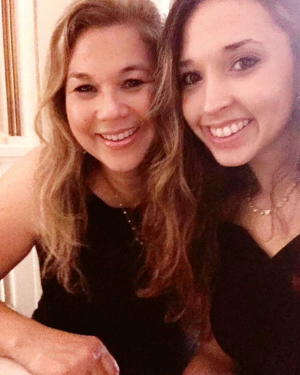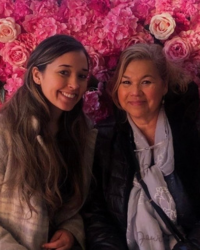Commencement is a family affair for mother and daughter in counseling program
As a child, Annelise Nearon had a heart for helping and healing others.
“If another kid got injured, I would take them to the bathroom, apply the hydrogen peroxide and bandage them up,” she recalled. “It’s just always been my calling to help others find healing.”
Nearon earned a bachelor’s in medical illustration and became interested in counseling while volunteering at the Capuchin Soup Kitchen in Detroit, where her supervisor — a Wayne State alumna — directed art therapy groups for children. She not only showed Nearon what it took to be an art therapist, but also helped her apply to the master’s program in counseling with concentrations in art therapy and clinical mental health, which is housed in the Wayne State University College of Education.
“Wayne State was the obvious choice,” said Nearon. “It is the only accredited art therapy program in Michigan, and I wanted to stay close to home.”
Soon after Nearon began the program, the COVID-19 pandemic hit. She said faculty did their best to accommodate students as they transitioned to online courses. Ultimately, learning how to navigate a virtual world proved beneficial.
“It prepared me for this new modality of providing counseling services, which is telehealth,” she said.
Nearon also enjoyed her practicum, which allowed her to apply what she was learning in the classroom in the real world. “I could bring an experience back to class and discuss it with my classmates and professors. It allowed me to determine whether I had taken the right approach, what I could have done better, and how I might have improved the client’s experience. Counseling can be an intense job depending on the population you serve. It was nice to obtain hands-on experience first to make sure it was the right fit.”

While pursuing her master’s, Nearon lived with her parents. She discovered she and her mother, Lourdes Fonseca-Nearon, shared a similar purpose.
“I would come home from class and share what I was learning with my mother, and she told me she had always wanted to earn her master’s in counseling and become a therapist,” said Nearon. “I told her it was not too late.”
Fonseca-Nearon said she has wanted to be a therapist since high school. The first person in her family to attend college, she earned a bachelor’s in psychology and Spanish. Fonseca-Nearon said she attempted to go to graduate school when her children were in high school, but it was a financial challenge. Now 63, she enjoyed hearing about her daughter’s experiences in the counseling program and had to muster up the courage to apply.
“Annelise said, ‘Mommy, you can do this,’ but I had a lot of self-doubt,” she said. “I thought I was too old. After graduation, I will only be able to work for a few years. It was during election season, and I thought, ‘we have two men older than me running for the highest office in this country — stop doubting yourself!’”
With the encouragement and support of the entire family, Fonseca-Nearon applied to the program and started a few semesters after Nearon. She also chose a concentration in clinical mental health but not art therapy.
“I am not artistic at all,” she said. “I am using a lot of my life experiences.”
The daughter of an immigrant who came to the United States at 19 to find work and a better life for his family, Fonseca-Nearon said she had a great deal of responsibility as the oldest child and only girl in her family. She often had to translate and interpret for her parents.
“That experience happens often in communities in which parents do not have the language skills,” she said. “They rely on their child to read and write things for them. We’re finding that it’s very stressful for the child and sometimes the child finds information that they don’t need to know at a young age. I was in a similar position, where your parents are immigrants and they're trying hard to survive, but they don’t have all the tools or the education to do so.”
Although she no longer lives in southwest Detroit, Fonseca-Nearon is still committed to the community. She volunteers for organizations and serves as a therapist to immigrants in the area through her internship. All counseling students must complete a supervised practicum and a counseling internship. These semester-long practical experiences provide them with opportunities to apply what they learn in the classroom in a real-world setting, where they can build relationships and treat clients. This aligns with Wayne State’s College to Career initiative, which seeks to provide all students with experiential learning opportunities that allow them to encounter the world, gain deeper insights and new perspectives, and prepare for careers.
“My goal was to work with the most marginalized populations,” she said. “There are so many challenges in the immigrant community. A spotlight was shined on many of them during the last administration. We heard about so many fathers — who were often the sole breadwinners — being deported, and we saw so much trauma among the children, many of whom began to experience depression and anxiety. I am doing my internship with that community, and I have been able to bring what I’ve learned in the classroom and through my own experiences — as the daughter of immigrants, a wife, a mother, a member of a historically marginalized group — into my work.”
Fonseca-Nearon said she was pleasantly surprised to learn that Wayne State offers a discount for older individuals. The university will pay 75% of tuition for students who are at least 60 years old on the first day of class.
“When I got the email, I thought it might be a scam,” she said. “My daughter told me it was legitimate and to take advantage of it. It was a real blessing.”
She said getting acclimated to being a student again was challenging, and earning her master's was "a family affair."
“When I had to write my first paper, I sat at the computer — which my son Robby had designed and set up for me — and cried,” Fonseca-Nearon admitted. “I told my husband I couldn’t do it, and he said, ‘Yes, you can.’ Our entire family was living at home during the pandemic, and they all rallied around me."
Fonseca-Nearon said she also appreciated the community she discovered in the counseling program.
"The professors really go above and beyond to make sure that we succeed, and I had the support of my cohort," she said. "We went through this journey together, cheering one another on, celebrating our successes, and helping one another when we were struggling. My classmates and professors became my extended family, and it is a beautiful thing to have found at my age. It not only made me feel young again, but it gave me a real sense of belonging.”

Towards the end of their programs, the mother-daughter duo had two classes together.
“When we had to do introductions in class, Annelise would say, ‘Here’s a fun fact you don’t know about me — my mom’s in this class,’ and all eyes would turn to me. Both professors said they had never had a mother and daughter in the same class.”
Nearon said it was fun to be in the same program with her mother at the same time.
“We got to share some books, which was a nice financial benefit,” she said. “Some of the concepts can be complex, especially when you are being exposed to them for the first time, so it was nice to have someone else to discuss and process the material with further. We supported one another throughout the program, and we learned a lot more about each other. Although being in school with my mother was something I never expected to happen, it was a good experience — and now, we’re going to walk together.”
Fonseca-Nearon said she has enjoyed the journey.
“I think it was divine intervention or providence that I ended up at Wayne State,” she said. “The program has given me a strong foundation and prepared me to do the work. I am already doing it. Every now and then, I think, ‘I’m someone’s therapist.’ I have learned that I can do hard things — I am built for this. This has been an amazing experience.”
Nearon, who works with adolescents, said she was hired immediately after completing her degree requirements in August. Her goal is to own her own art therapy studio.
“I feel like counseling is like let’s dive in and talk about your emotions and deepest, darkest secrets, whereas art therapy is more fluid,” she said. “You can be creative and gain insight from others’ creative process. And, art therapy is great for all ages, from children to the elderly. I don’t know exactly what my future holds, but I am grateful to Wayne State for allowing me to flourish in this way. I'm excited about being able to take what I have learned and spread my wings and fly.”